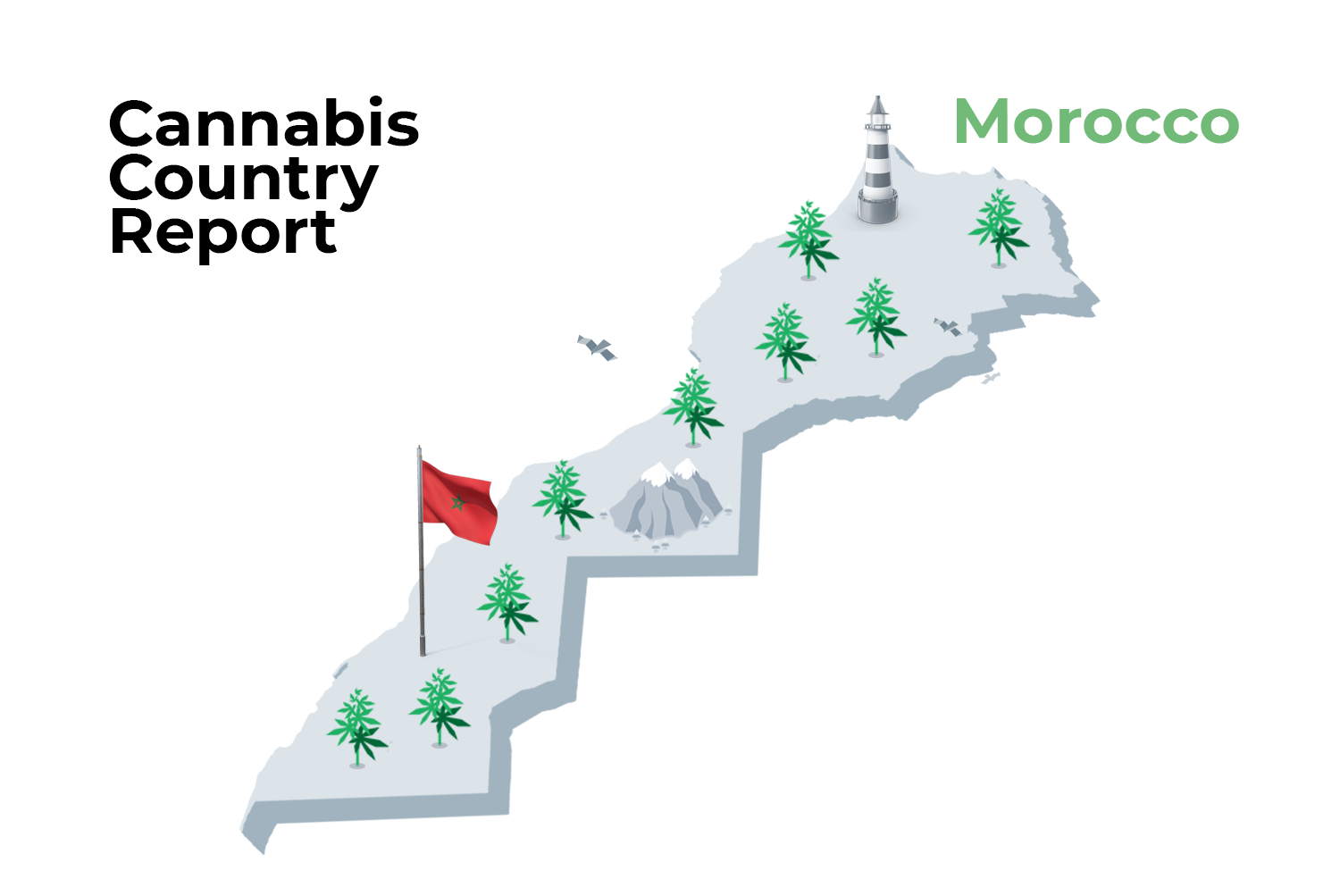
The information provided in this article is for general informational purposes only. While we endeavour to provide accurate and up-to-date information, there may be instances where information is outdated or incorrect. The contents of this article should not be taken as legal advice nor should it be relied upon in making any business, legal or other decisions. We encourage readers to consult with a qualified legal or professional advisor to obtain proper advice based on your unique circumstances. Cannavigia disclaims any liability for any loss or damage arising out of or in any manner connected with the use of or reliance on the information provided in this article.
This cannabis country report Morocco serves as an introduction to potential cannabis growers in Morocco on how to legally grow cannabis and how to get a cannabis license. This information is relevant to all growers. The information was correct at the time of publication.
The current status and some history on cannabis
In March 2022 under bill number 13.21 and draft decree 2.21.642, Morocco became the latest African country to legalise the grow of medical marijuana. Recreational usage remains illegal and theoretically carries harsh sentences.
The law identifies three provinces, Al Hoceima, Chefchaouen and Taounate, allowed to cultivate and produce cannabis. It leaves the door open to include other regions in the process based on domestic and international investors’ demand for cannabis supply chain activities.
![Download Now: Free Cannabis License Checklist for Morocco [Get Your Copy]](https://no-cache.hubspot.com/cta/default/6213174/63ff5c0c-822f-4ca5-bf5f-54aafc351a5a.png)
Together with Afghanistan, Morocco is one of the top growers of illegal cannabis in the world, although the government has turned a blind eye to its growing for decades. It is estimated that 400 000 people or some 60 000 households live on the cultivation of cannabis in the three demarcated areas. The cannabis subsistence farmers in these areas claim that cannabis is the only crop that will grow there.
Traditionally, cannabis has been part of the Moroccan culture and tourism for centuries. From the sixteenth century it was grown nationwide on a small scale for local use, in gardens and orchards, but it was only in the 18th century that the Rif region in the far north became a noted center of production, as it is now recognized in modern times. In 1890, Sultan Hassan I instituted strict regulations on cultivation and trade, but also conferred clear cannabis production privileges on several Rif tribes. In the 1950s, the rights of the Rif tribes to cultivate cannabis was reconfirmed, in response to tensions in the restive region. In 1956, with the new independence of Morocco, King Mohammed V prohibited cannabis nationwide.
The change in cannabis legislation
Farmers in the three traditional growing areas (the ones legalised now) have been growing cannabis as a main source of income, whether it was illegal or not.
The reason for the change in legislation, according to the government is to improve the economic standing of these farmers. In the illegal black market, farmers earn 4% of the final turnover of the crop, the government claims that under its control this will rise to 12%.
The law also recommends, in a bid to support the efforts of negotiation between farmers and manufacturers, that farmers set up cooperatives which will be in charge of signing contracts with manufacturers and ensuring the preservation of farmers’ rights, in addition to allowing the farmers to acquire the best methods for sustainable agriculture, to be open to global experiences in this field and to the acquisition of quality seeds.
What is unique is that Morocco, like South Africa appears to want to focus the industry in a specific part of the country for strategic, economic, and sustainable development, as well as crime prevention reasons.
Morocco has already established a National Agency for the Regulation of Cannabis-related Activities. This agency will act as a focal administrative point for government officials in the Interior, Agriculture, and Health and Trade industries and decide on the terms of the licenses themselves.
What you need to know to get a cannabis license in Morocco
The Agency has determined that:
- No cannabis-related activity is legal unless the actor involved has received a permit from the Agency
- The production quota will be decided (annually) based on demand
- A THC limit will be determined for most cannabis farming at a later stage
Approval or rejection of a cannabis license in Morocco
The National Agency has a 10-day deadline to issue an administrative application follow-up, and a 60-day deadline from the date of the application’s submission to respond to each permit application, either with an approval or a rejection.
Any denial of a permit needs to be justified by the agency, whether for farming, production, commercialization, or export.
The article also specifies that a delay in or lack of response from the agency should not be considered as a rejection.
The possible causes of retraction of permit:
- Permit is retracted by request of owner
- Permit is retracted in case of change of ownership as per article 29
- Permit is retracted in case of violation of one of the rules and criteria mentioned in this text and upcoming legal texts on the matter
- Permit is retracted in case of a halt in activity during a period of two consecutive years
- Permit is retracted in case of infringement of existing and valid drug regulating laws
- Permit is retracted if the individual holding the permit is found to be related to a member of the national agency’s executive board
The article also specifies that the agency cannot retract the permits without written notice to the concerned party, with a 15-day deadline for legal or administrative rebuttal from the entity holding the permit
The validity of all permits is 10 years. All permits are renewable upon demand, following the same process.
Sources
https://hightimes.com/news/morocco-moves-into-medical-cannabis-cultivation/
https://hightimes.com/news/morocco-expected-pass-cannabis-legalization-soon/
https://www.africanews.com/2021/03/12/morocco-backs-legalising-cannabis-for-medical-use/
https://infomineo.com/the-legalization-of-cannabis-in-morocco/
https://www.middleeasteye.net/news/morocco-cannabis-legalisation-farmers-drug-cartels
https://www.theafricareport.com/74949/morocco-to-legalise-cannabis-for-medical-and-industrial-use/
https://northafricapost.com/55962-morocco-three-provinces-selected-to-grow-cannabis-legally.html
https://www.moroccoworldnews.com/2021/03/337278/moroccos-new-cannabis-legalization-bill-explained
https://www.middleeastmonitor.com/20210731-morocco-bill-to-legalise-cannabis-enters-into-force/
https://www.reuters.com/article/us-morocco-cannabis-idUSKBN2BA1YN

Comments